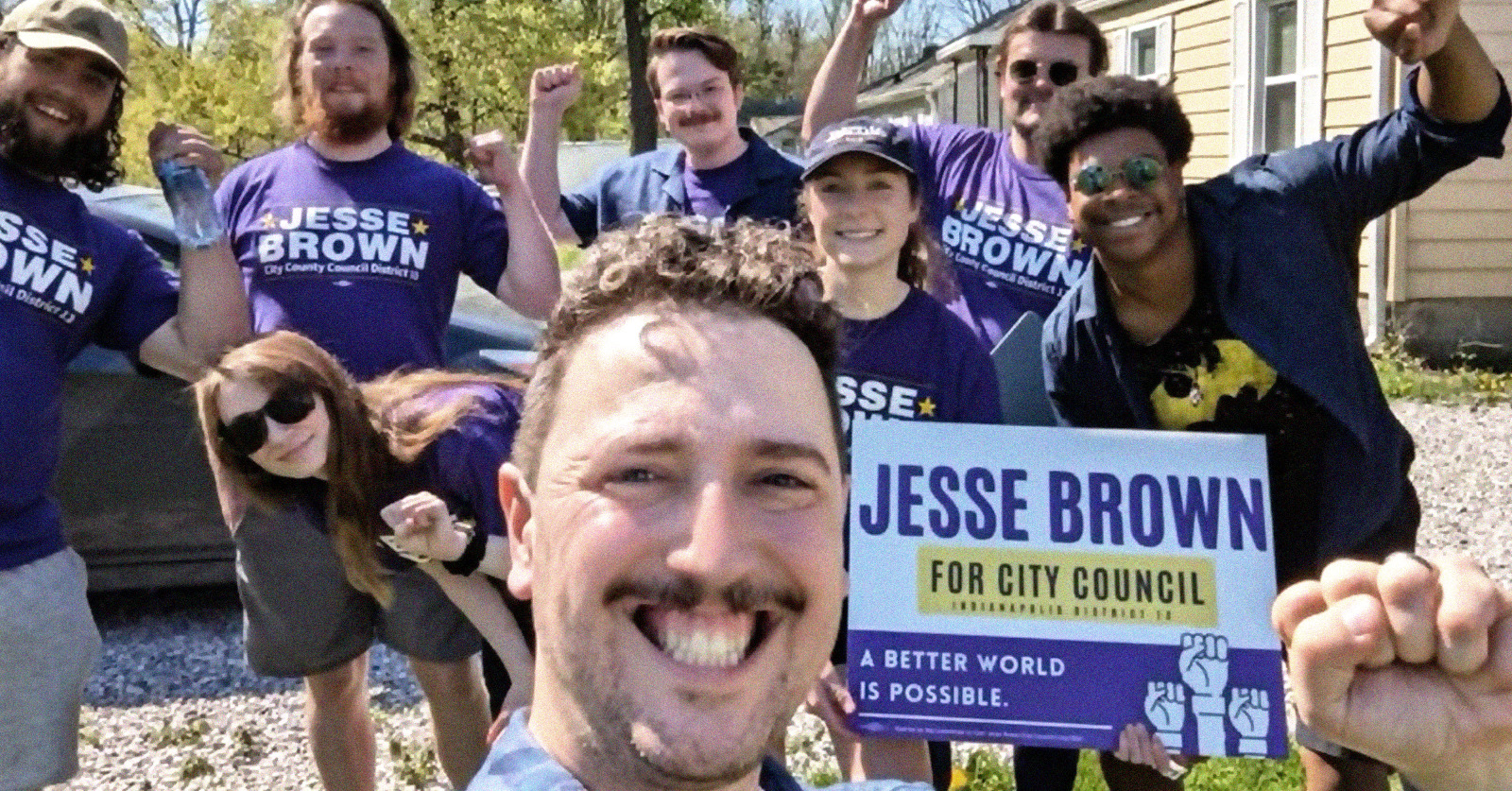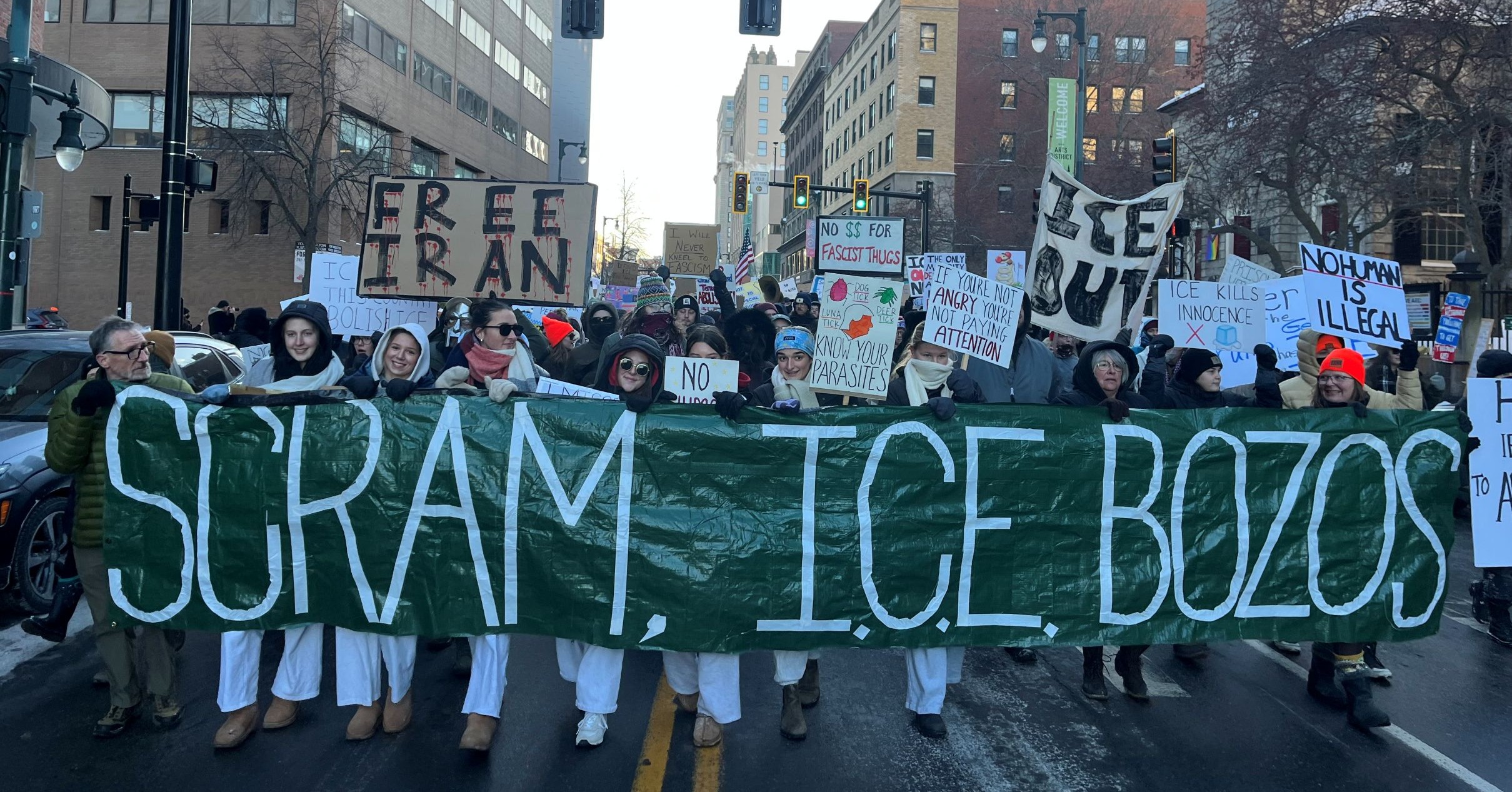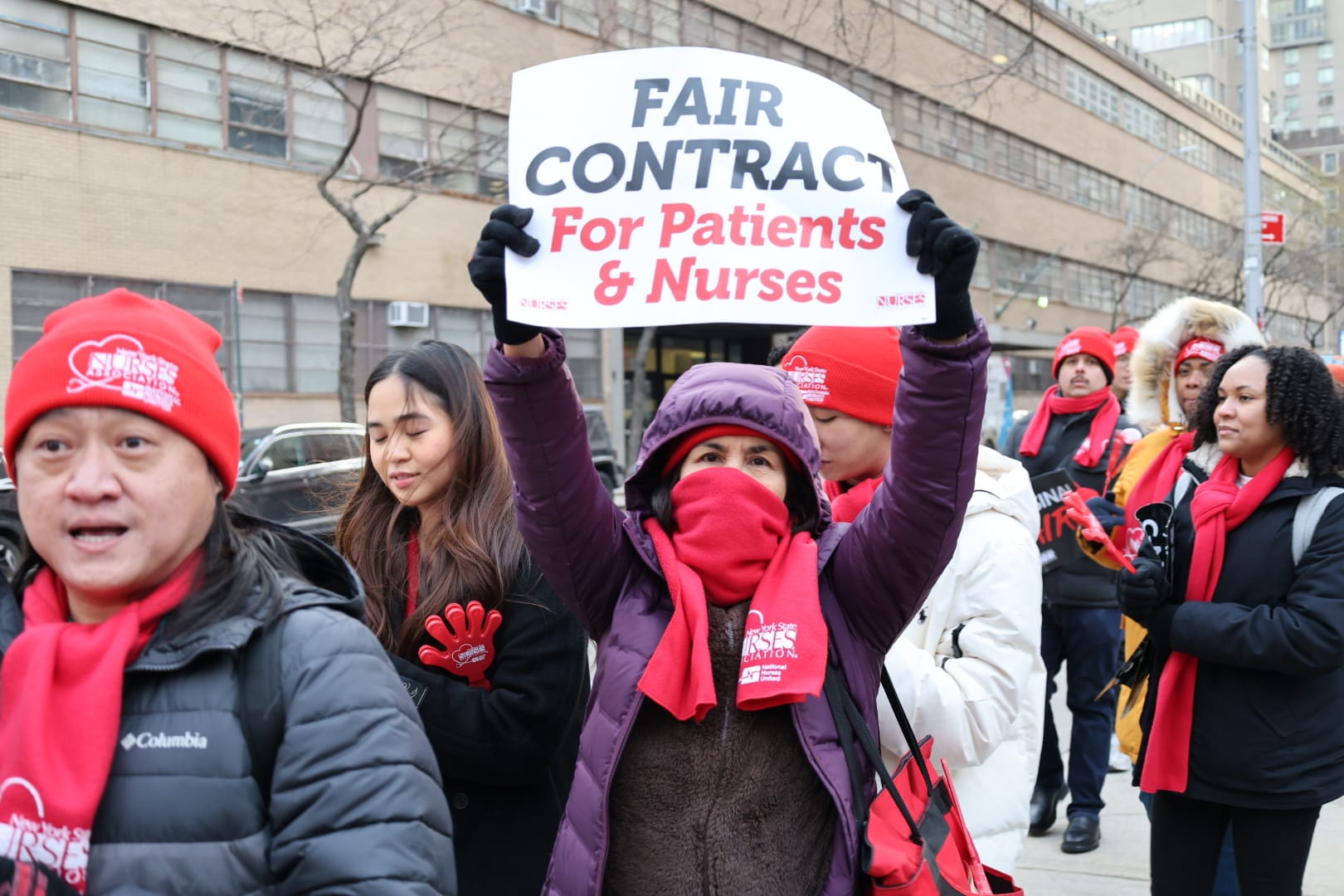Not even two months into his term in office as a newly-sworn-in city-county councilor (Indianapolis has a joint council chamber), democratic socialist Jesse Brown has made headlines by introducing a new way of doing politics to the city. It’s a big change after years in which the Indiana state legislature’s Republican super-majority has preemptively vetoed or overturned most progressive changes by Indianapolis’s super-majority Democratic City-County Council.
Brown won in a massive political upset last year, defeating a long-time incumbent Democrat and member of the Council’s leadership by twelve points. Brown, a member of the Democratic Socialists of America, ran a people-powered campaign, driven by volunteers — largely from DSA and high school members of its youth wing, YDSA — that promised a campaign and an elected official fundamentally different from politics as usual.
Key to Brown’s vision of his role as an organizer on the city council is to bring political fights out of backroom conversations and into the public eye for Indianapolis voters to see and judge for themselves.
Over the past few weeks Brown has launched a grassroots effort to unseat far-right Republican State Senator Aaron Freeman. In response to Brown’s public effort to recruit volunteers and raise money for a possible challenger to Freeman, his Democratic Party colleagues have threatened to kick him out of the Democratic caucus.
Brown hopes to force the party establishment to differentiate themselves from him, and his transparent, bottom-up approach. Already he is building a base for independent, fighting, grassroots politics in Indianapolis and waging public confrontations with both political parties’ corporate establishments, all the while constantly maintaining an open door to any and all willing to join the fight and work together. His peers in the Democratic caucus have reacted to this by threatening him with primary challenges, shutting him out from access to power, and expulsion from the caucus.
Jesse Brown sat down with Oren Schweitzer to talk about his successful campaign and whirlwind two months in office.
Oren Schweitzer: What are the biggest issues facing people in your district? What was the platform you ran on to address these issues?
Jesse Brown: I live in the ZIP code which has the lowest life expectancy in Central Indiana — last I checked, 68 years old. It’s been dropping for over a decade. Seven miles away life expectancy was seventeen years longer. I decided to run for office because we had a supermajority Democratic City-County Council and yet we were literally taking years of life from the poor to give to the rich.
“The Democratic mayor claimed they had a balanced budget. It was balanced on working peoples’ backs.”
I ran on three major issues. The first was infrastructure and transportation. The bus system in Indianapolis is drastically underfunded and underutilized. It’s mainly poor and working-class people, which in Indianapolis mainly means black people and people of color, who ride the bus. Our roads are in absolute disrepair. My wife and I share a car. We have lost seven tires, two rims, and had to fix our suspension system three times because of how bad the potholes are in Indianapolis. The Democratic mayor claimed they had a balanced budget. It was balanced on working peoples’ backs.
Issue number two was to not give a dime of tax money to developers and companies unless they promise to be neutral to a union and pay a livable wage to everyone who works in the building.
Issue number three was accountability and transparency. It was harder to define, but really resonated with my neighbors. Our local and state government treats constituents like we’re dirt, don’t deserve any information, don’t deserve to ask questions, and don’t deserve to see results.
I won by about 12 percent. I’ve been told it was the biggest upset in Indiana that year.
Schweitzer: You identify as an “organizer first, legislator second.” What does this mean to you as a city councilor?
Brown: It’s not about me doing a singlehanded crusade against these oppressive systems. It’s about organizing the mass movement that actually has the power and ability to make these changes we want to see. I’ve received “friendly” advice from other councilors that I’ll need to be in these backroom meetings and keep things quiet and confidential; that it’s great that I’m an organizer but those skills won’t come in handy at all anymore. I’ve had to prove that that’s not the case.
I consider my first job to be creating more leaders that can solve problems by themselves. My second job is to listen to people and figure out what they want me to do. That said, I do fight. That’s what I promised to do when I knocked on a bunch of doors, and I won a very decisive, unlikely political victory. I promised that I would fight for better standards of living, to stop inequality, to stop gentrification. Though I didn’t run on my stance on Palestine, I’m showing up to every rally I possibly can and demanding a ceasefire.
Schweitzer: What is your relationship with bottom-up movements and organizations like DSA? What would be the ideal relationship?
Brown: North Central High School YDSA helped me as I was trying to build an electoral program in DSA that we didn’t really have. We first helped a kind of progressive liberal but good politician win in a traditional Republican stronghold. I would organize canvass shifts with the goal of twenty canvassers. Sixteen of them would be highschoolers from a YDSA chapter. YDSA, more than any other individual group, were responsible for the only State House seat that flipped red to blue.
YDSA continued to help me throughout my campaign and was a huge source of volunteers. I had a volunteer Instagram manager who is now a YDSA leader at her college. A lot of people got interested in my campaign and went on to start YDSA chapters at their colleges. On the southside of Indy, and the west side of Indy, two local schools have budding YDSA chapters that were inspired in part by my campaign.
“In a perfect world, my relationship with DSA and other bottom-up movements would be to listen to them and do what they say.”
In a perfect world, my relationship with DSA and other bottom-up movements would be to listen to them and do what they say. I don’t think that it’s my job to lead DSA or guide it in a specific direction. I should share what I’m learning from the insiders’ table and let people know all of the context that I’m getting. My wife is an attorney. She says that it’s not your job to tell your client what to do. Your job is to tell your client what the likely consequences of their actions will be.
I’m there to give as much information as I’m gathering from my role, to do what my constituents say, and empower them to make those decisions. That’s really important as we move toward a socialist society so that the working class and the people writ large have some experience in setting policy and understanding the trade-offs that politicians are faced with.
I’ve painted a picture of the ideal. In actuality, our local DSA chapter has tons of members on paper, but we’re a little bit scattered. We don’t have a socialists in office (SIO) program to connect the chapter with elected officials. I have taken more of a front and center role than I think is actually healthy. It’s not my narrative. It’s DSA’s narrative. We are now in the process of setting up a more formal socialists in office (SIO) program.
Schweitzer: You’ve recently made some local headlines for leading the fight against Republican State Senator Aaron Freeman. Who is Aaron Freeman? What is your public campaign against him?
Brown: Aaron Freeman is a right-wing Republican attorney. He wasn’t very successful on the Indy City-County Council, but he failed upwards into a State Senate seat. For years he has been fighting public transit expansion in Indianapolis. He takes more money from the auto industry than any other politician in the state.
His bill is a bad-faith claim to “pause” a bus line project that is already 90 percent through design and that will receive $150 million in federal grants if we do it now with dedicated bus lanes. He claims he wants to “study” the dedicated lanes and “pause” the project for the year. That will kill the federal funding. It is a massive amount of money that he is going to lose for the people of my district.
So many pedestrians and cyclists are hit in our state that the federal government asked us to study where people are getting hit and why. Two of the top four places are on Washington Street. We want to do dedicated bus lanes, slow traffic, improve safety, add ADA ramps, and crosswalks, to help protect people from getting hit and killed.
“At the State House, I saw the Democratic Party strategy to ‘not poke the bear.'”
At the State House, I saw the Democratic Party strategy to “not poke the bear.” There was a woman whose seven year-old daughter was killed on Washington Street by a speeding driver who testified on Senator Freeman’s bill. She had tears in her eyes explaining how she stays involved in this fight because she wants to protect other people’s children. Aaron Freeman was looking at his phone and ignoring her the entire time.
Dozens of people who showed up were super pissed off. Every other Democrat in the state won’t give them any kind of leadership. Their position is: “Trust us. We’ll get it done in a closed door deal later on.” I decided that wasn’t good enough.
I know how to organize people. I know how to run campaigns. I posted that I would knock 1,000 doors for anyone running against Aaron Freeman and asked who was with me. A few people agreed. I asked if they’d sign a form, and give me their name and contact information, saying that they’d knock some doors. People said yes.
To date, we’ve raised money from 120 unique donors, which is more than in the entire 2020 election against Freeman and it’s only February. We have 85 committed volunteers, 25 of whom came to a Zoom training, and 40 of whom came to an in-person meeting to plan our strategy and campaigns.
Schweitzer: What is the Democratic Party’s strategy for fighting Republicans, and how is yours different?
Brown: My good faith read of the moderate Democrats’ strategy is that they feel they can’t beat the Republicans in the state so the best we can do is try and work with moderates to blunt or stealthily kill off the worst of the Republican legislation. The state government is really big on preemptively stopping local governments from deciding policy. We already cannot raise the minimum wage, ban plastic bags or puppy mills or cars turning right on red. We can’t have rent control.
I understand that we have to look at tactics and figure out what is effective. For example, we have learned not to pass progressive policy while the State House is in session because they have proven that they will immediately preempt and override us while it’s in the news. As silly as it is, by waiting until after they’re out of session, we can get progressive policy passed. They have less incentive to go “fix” it because it will no longer be in the news and they’ll forget that it happened.
But their tactics are not in service of a strategy at all. I asked them what the end game was. We have had super-majority Republican Party rule for the last 15 or 20 years. How does that stop?
My strategy is to not hoard power and keep everybody who’s an outsider out of the room, but to instead pull up more chairs to the table, give away my secrets, organize, teach people how to win campaigns, knock doors, raise money, talk to friends and neighbors, teach other people how to organize. That is exactly what the Democratic Party’s leadership is afraid of, and has led to threats of discipline against me.
Schweitzer: Why has the Democratic Party leadership threatened you with discipline? How did they threaten you?
Brown: I am still in the Democratic caucus and we have rules about confidentiality. I think those rules make some sense because you can be in the room with all of your peers, let people know what you’re thinking, and not have to worry about how it will play in the media. But when I’m attacked semi-publicly by a huge number of my peers, leadership is of the opinion that this is also confidential and I’m not allowed to talk about it. This doesn’t make any sense to me at all.
They don’t believe socialists should have a place in the Democratic Party. They didn’t object when I ran as a Democrat in November. But council leadership had to tell me that there was a concerted effort to not seat me as part of the Democratic caucus.
They told me that my social media makes people uncomfortable. I asked if we had social media rules about what we were allowed to post and they said no. I asked if there were any specific posts that they wanted me to look at and retract, and I was told they hadn’t looked at it themselves. They did end up deciding to seat me as a Democrat, but they made it clear that I was on thin ice.
“A councilor who I had spent maybe ten minutes talking to ever called me and said: ‘Listen, you better fucking take that little fucking GoFundMe page you have down right fucking now…'”
A councilor who I had spent maybe ten minutes talking to ever called me and said: “Listen, you better fucking take that little fucking GoFundMe page you have down right fucking now. I’d rather have you inside the tent than outside the tent, but don’t push this or else you’re going to be outside.” I replied: “Thank you for that insight, that’s different from my perspective, but I’ll certainly think about it and I’ll consider it.” He said: “Don’t fucking think about it. Just fucking do it right now.” The fact that he, who wasn’t in leadership, made these comments, made me realize that they’re going to keep increasing the saber rattling, they’re going to expel me from the caucus.
The journalist James Briggs — who is a moderate, disagreed with me, and thought my strategy was bad — asked to interview me. I said let’s ask the public and see how they feel about this strategic difference. In the article, I explained that my strategy was to fight, why I thought the existing strategy was insufficient, and that backroom deals couldn’t be the only tactic we had.
The article was an attempted character assassination, but probably at a rate of one hundred to one, the people of Indianapolis have agreed with me and have said “Screw the guy who wrote the article, screw your fellow Democratic peers, you’re right, and we want more people to be fighting.”
My council peers literally thought I was organizing a socialist campaign to pretend to be their constituents and email [those councillors] saying not to expel me. I did not tell anyone to do that. It was an organic response to this article and they would not believe their own constituents when they said: “I wish that you were fighting like Jesse. But if you’re not going to fight, at least let him fight.”
Schweitzer: Does this experience confirm your belief in the need for a working-class party independent of the Democrats? What do you view as the path to getting there?
Brown: The Democratic Party at its top levels is bought and paid for by capitalists that we need to fight against. All the way down the ladder, they try their best to keep outsiders out, to keep socialists out, to keep real people power politics out. They tried to keep me out. The mayor endorsed my primary opponent. Everybody endorsed my primary opponent.
My contention is that the Democrats should be the working-class party. We should be the labor party. We should be the ones who don’t take money from corporations. We should be the ones who have fully transparent, democratic, bottom-up processes.
I am forcing the corporate Democrats, the moderate Democrats, to say: “that guy who is wildly popular, who is staying rooted in his community, who listens to his constituents, who doesn’t take money from corporations or any organizations at all — that’s bad, we’re not like that.” They have to differentiate themselves from me. I challenge them: “Aren’t these the values of Democrats? Don’t we believe in power? Aren’t we showing up at picket lines? Aren’t we organizing people? Aren’t we trying to improve neighborhoods? I thought that’s what the Democrats were. Am I wrong?” I’m forcing them to make the break.
“[W]e have had a president of a local labor union agree to speak at a local DSA annual event, which has never happened here before. That same president has publicly said that both parties are really disappointing in 2024, that we need a labor party, and also that ‘labor loves Jesse Brown.'”
In the last two months — in the last week — we have had a president of a local labor union agree to speak at a local DSA annual event, which has never happened here before. That same president has publicly said that both parties are really disappointing in 2024, that we need a labor party, and also that “labor loves Jesse Brown.” I am meeting with union leaders. I am meeting with everybody I can, just to forge ties that will be there when or whether I am kicked out of the Democratic Party.
Schweitzer: How are you orienting toward the presidential election and the broader fight against the far right?
Brown: The thing that I’m consciously avoiding doing is to make excuses. I think that Biden is facilitating genocide, that will be his legacy, and people will spit on his grave. I wish he would not go down this path, but it doesn’t seem like he’s listening to the many, many people trying to tell him this.
“Do I think that Trump would be worse? Yes I do… I do think it’s important to keep Trump out of office, even though I am no friend of Biden and am very critical of him in almost every way.”
Do I think that Trump would be worse? Yes I do, especially while he’s publicly saying he wants to round up all the leftists and get rid of us in one way or another. He’s promising a dictatorship at this point. I do think it’s important to keep Trump out of office, even though I am no friend of Biden and am very critical of him in almost every way.
I have an experience that might be a strategy that we could pursue nationally. The Democratic mayor campaigned against me in my primary, so I campaigned openly against him too. He won his primary anyway. I still was never going to endorse him in the general, and never going to excuse his poor leadership.
I printed out literature before the general election. It said: here’s our vision and values. We want communities where our kids are safe. We want corporate money out of politics. We have a new bold vision for the East Side. Vote Jesse Brown because I will get that to you, and Jefferson Shreve, the Republican candidate [for mayor], would make it way harder. Vote against Jefferson Shreve. I did not mention the [incumbent Democratic] mayor’s name at all. It was effective. I ended up turning out lots of people to vote who otherwise wouldn’t have voted and I didn’t have to weirdly associate myself with a political anchor. I think that is how we should approach 2024 with Biden.
Similar style tactics to Listen to Michigan, whether Biden is the nominee or not, could also work. Trump is an existential threat to democracy but Biden is not acting like it. We should be willing to accept unorthodox tactics in order to deal with this political crisis. The only option cannot just be the insider politician, with nothing else to do.




